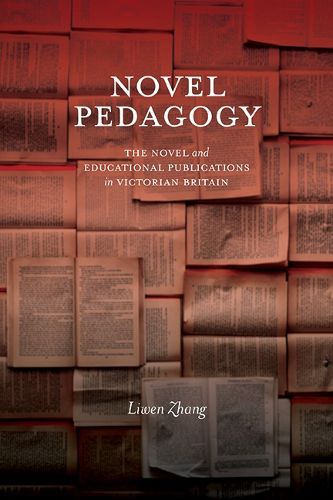Readings Newsletter
Become a Readings Member to make your shopping experience even easier.
Sign in or sign up for free!
You’re not far away from qualifying for FREE standard shipping within Australia
You’ve qualified for FREE standard shipping within Australia
The cart is loading…






This title is printed to order. This book may have been self-published. If so, we cannot guarantee the quality of the content. In the main most books will have gone through the editing process however some may not. We therefore suggest that you be aware of this before ordering this book. If in doubt check either the author or publisher’s details as we are unable to accept any returns unless they are faulty. Please contact us if you have any questions.
Explores Victorian writers' conception of the novel's potential to become serious knowledge and differentiate itself from other educational genres.
Is the novel a category of knowledge that merits serious study? Even if the novel has shed the stigma of being mindless entertainment, one might easily assume that reading a novel is not "studying," unless one reads closely and carefully, preferably from a scholarly edition or for a scholarly purpose. Novel Pedagogy explores how Victorian writers envisioned the novel's potential to become knowledge long before the form's ascendence into the ivory tower. Liwen Zhang argues that Victorian novelists' constant critique of schooling, on the one hand, and their frequent invocation of deep knowledge, on the other, are not self-contradictory. Instead of offering a blissful escape from education, writers such as William Thackeray, Charles Kingsley, Charles Dickens, Elizabeth Gaskell, George Eliot, and George Gissing seek to offer uniquely novelistic pathways to knowledge. Novel Pedagogy offers a new model of novelistic epistemology by showing how the novel, unlike other educational genres, reflects on the unpleasant realities of learning-and of not learning-amid the ubiquity of ineffective textbooks, reluctant students, and false motivations.
$9.00 standard shipping within Australia
FREE standard shipping within Australia for orders over $100.00
Express & International shipping calculated at checkout
This title is printed to order. This book may have been self-published. If so, we cannot guarantee the quality of the content. In the main most books will have gone through the editing process however some may not. We therefore suggest that you be aware of this before ordering this book. If in doubt check either the author or publisher’s details as we are unable to accept any returns unless they are faulty. Please contact us if you have any questions.
Explores Victorian writers' conception of the novel's potential to become serious knowledge and differentiate itself from other educational genres.
Is the novel a category of knowledge that merits serious study? Even if the novel has shed the stigma of being mindless entertainment, one might easily assume that reading a novel is not "studying," unless one reads closely and carefully, preferably from a scholarly edition or for a scholarly purpose. Novel Pedagogy explores how Victorian writers envisioned the novel's potential to become knowledge long before the form's ascendence into the ivory tower. Liwen Zhang argues that Victorian novelists' constant critique of schooling, on the one hand, and their frequent invocation of deep knowledge, on the other, are not self-contradictory. Instead of offering a blissful escape from education, writers such as William Thackeray, Charles Kingsley, Charles Dickens, Elizabeth Gaskell, George Eliot, and George Gissing seek to offer uniquely novelistic pathways to knowledge. Novel Pedagogy offers a new model of novelistic epistemology by showing how the novel, unlike other educational genres, reflects on the unpleasant realities of learning-and of not learning-amid the ubiquity of ineffective textbooks, reluctant students, and false motivations.